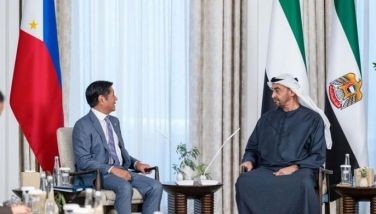VP Noli cites anti-poverty gains in 2005
July 1, 2006 | 12:00am
Despite the difficulties brought by the political crisis last year, Vice President Noli de Castro said yesterday that the National Anti-Poverty Commission (NAPC) made significant gains in 2005.
De Castro, concurrent NAPC chairman, said during the agency’s eighth anniversary celebration that its accomplishments include the development of an overall poverty-reduction strategy and corresponding tools, mechanisms and policies and localization of the government’s strategies.
He added that NAPC also made progress in fostering basic sector participation and empowerment; ensuring that micro-finance services reach their target clientele; promoting greater access to water and sanitation services; supporting the Mindanao anti-poverty center and other special poverty-reduction activities.
De Castro urged the NAPC to "be more aggressive in promoting programs that will eliminate poverty" and "take a more active role in generating resources for the anti-poverty campaign."
He said the NAPC should exert a greater effort to ensure maximum effectiveness of its programs, which "means taking a second look at our indicators and giving more emphasis on those which measure outcomes, rather than processes... Process is important, particularly in anti-poverty efforts. But at the end of the day, let us not forget to ask ourselves: ‘Have the lives of the poor improved?’" De Castro also wants the NAPC to focus more on its resource-generation function.
"I see NAPC as a big receptacle for fund mobilization, a function that is in fact included in Section 7 of Republic Act 8425," he said. RA 8425, which created the NAPC, is also known as the Social Reform and Poverty Alleviation Act.
The NAPC has started on a new anti-poverty project that seeks to reconcile and integrate the government’s population management and poverty alleviation programs.
The project, known as "Harmonizing Approaches for Population and Poverty Integration or HAPPI," will identify gaps and challenges in the population management and poverty reduction programs and will address these with the help of national and local government units, civil society groups, donor organizations, and the private sector.
"We believe that if we don’t synchronize our act, we might not meet our target, so we have to know what ways and means we operationally link and interface together using harmonized approach," NAPC Assistant Secretary and program coordinator Dolores Castillo said during the agency’s anniversary celebration.
A technical working group, headed by the NAPC in partnership with the Commission on Population, was created to oversee the implementation and formulate an overall program to harmonize and integrate population and poverty program linkages.
HAPPI was funded by the United Nations Population Fund (UNFPA). The NAPC will focus on 10 priority provinces, namely Ifugao, Mountain Province, Masbate, Bohol, Eastern Samar, Lanao del Sur, Tawi-Tawi, Sulu, Maguindanao and Sultan Kudarat. — With Helen Flores
De Castro, concurrent NAPC chairman, said during the agency’s eighth anniversary celebration that its accomplishments include the development of an overall poverty-reduction strategy and corresponding tools, mechanisms and policies and localization of the government’s strategies.
He added that NAPC also made progress in fostering basic sector participation and empowerment; ensuring that micro-finance services reach their target clientele; promoting greater access to water and sanitation services; supporting the Mindanao anti-poverty center and other special poverty-reduction activities.
De Castro urged the NAPC to "be more aggressive in promoting programs that will eliminate poverty" and "take a more active role in generating resources for the anti-poverty campaign."
He said the NAPC should exert a greater effort to ensure maximum effectiveness of its programs, which "means taking a second look at our indicators and giving more emphasis on those which measure outcomes, rather than processes... Process is important, particularly in anti-poverty efforts. But at the end of the day, let us not forget to ask ourselves: ‘Have the lives of the poor improved?’" De Castro also wants the NAPC to focus more on its resource-generation function.
"I see NAPC as a big receptacle for fund mobilization, a function that is in fact included in Section 7 of Republic Act 8425," he said. RA 8425, which created the NAPC, is also known as the Social Reform and Poverty Alleviation Act.
The project, known as "Harmonizing Approaches for Population and Poverty Integration or HAPPI," will identify gaps and challenges in the population management and poverty reduction programs and will address these with the help of national and local government units, civil society groups, donor organizations, and the private sector.
"We believe that if we don’t synchronize our act, we might not meet our target, so we have to know what ways and means we operationally link and interface together using harmonized approach," NAPC Assistant Secretary and program coordinator Dolores Castillo said during the agency’s anniversary celebration.
A technical working group, headed by the NAPC in partnership with the Commission on Population, was created to oversee the implementation and formulate an overall program to harmonize and integrate population and poverty program linkages.
HAPPI was funded by the United Nations Population Fund (UNFPA). The NAPC will focus on 10 priority provinces, namely Ifugao, Mountain Province, Masbate, Bohol, Eastern Samar, Lanao del Sur, Tawi-Tawi, Sulu, Maguindanao and Sultan Kudarat. — With Helen Flores
BrandSpace Articles
<
>
- Latest
- Trending
Trending
Latest
Trending
Recommended
November 25, 2024 - 12:00am
November 24, 2024 - 12:00am
November 24, 2024 - 12:00am




























